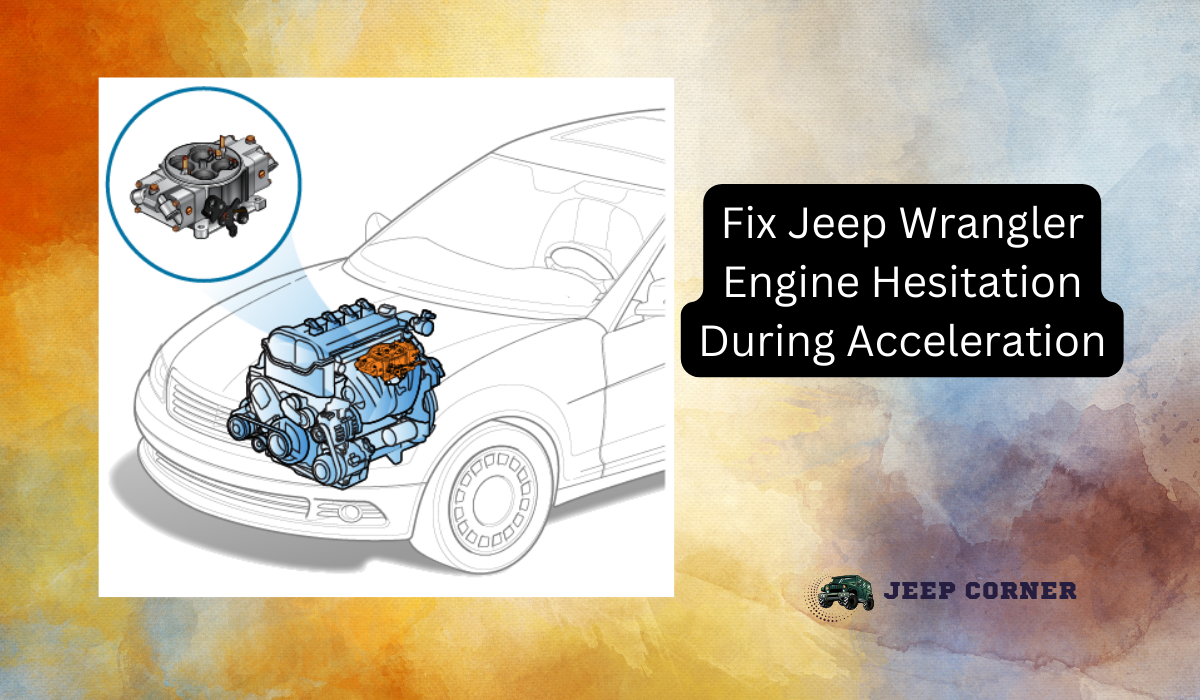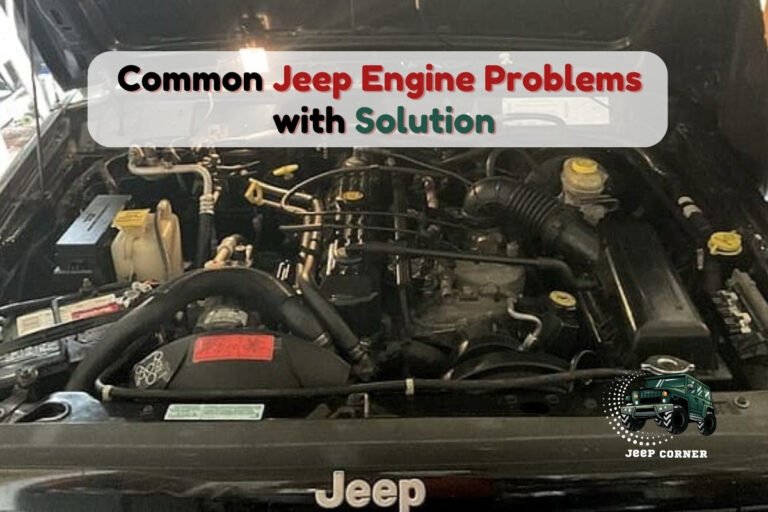Fix Jeep Wrangler Engine Hesitation During Acceleration [Causes & Solution]
Engine hesitation during acceleration is quite annoying and distressing. It even rises up when you have no clue about this issue and no mechanic around you to give a hand. Thus, not knowing how to fix it may lead to potential accidents.
So, how exactly can you fix Jeep Wrangler engine hesitation during acceleration? Well, many factors like faulty fuel filters, spark plugs, or vacuum leaks can cause hesitation during acceleration. And fixing them is the solution here.
If your Jeep Wrangler is experiencing engine hesitation, it’s important to identify the root cause and take steps to fix the issue. So what causes the hesitated acceleration in the first place? And what’s the remedy? Read on to find out!
Table of Contents
What Causes the Wrangler Engine to Hesitate During Acceleration?
The Wrangler engine is reliable and powerful but can experience hesitation during acceleration. This issue can be caused by a wide range of different factors, so it is important to identify the cause of the problem to fix it.
The most common causes are
Clogged Fuel Filters
The fuel filter is responsible for straining impurities out of the fuel before it enters the engine. If the filter is clogged, it can restrict the flow of fuel, resulting in a lack of power or even a stall during acceleration.
To check the fuel filter, remove the fuel line from the filter and inspect it for blockage. Put in a new filter if the old one is too blocked.
Faulty Fuel Pump
Fuel pump problems are also known to cause hesitation during acceleration. It’s responsible for pushing fuel from the gas tank to the engine. If the pump is faulty, it may not be able to supply enough fuel to the engine, leading to a lack of power or hesitation when accelerating.
To check the fuel pump, you’ll need to have a mechanic inspect the pump and test its pressure.
Faulty Oxygen Sensor
It’s responsible for monitoring the air-fuel mixture in the engine. If it’s faulty, it can cause the engine to run too lean or too rich, resulting in hesitation or jerking during acceleration.
To check the oxygen sensor, you’ll need to have a mechanic inspect it and test its output.
Clogged Catalytic Converter
A clogged catalytic converter can also lead to engine hesitation in a Wrangler. It converts harmful exhaust gases into less harmful ones. If the converter is clogged, it can restrict the flow of exhaust gases, resulting in a lack of power or hesitation when accelerating.
Vacuum Leak
The vacuum system controls the flow of air and fuel to the engine. A leak in the vacuum system can cause the engine to run too lean or too rich, resulting in hesitation or jerking during acceleration.
Faulty Spark Plug
Finally, a faulty spark plug can lead to engine hesitation in a Wrangler. Its job is to ignite the air-fuel mixture in the engine. So, if the spark plug is faulty, it can cause the engine to misfire, leading to a lack of power when accelerating.
Identifying the cause of engine hesitation in a Wrangler is the first step in fixing the problem. Once you’ve identified the cause, you can take the necessary steps to repair the issue and get your vehicle back in top condition.
Fix Jeep Wrangler Engine Hesitation During Acceleration [Solutions]
Unfortunately, one of the most common issues that Jeep Wrangler owners may experience is engine hesitation during acceleration. This can be a very frustrating problem, making it difficult to drive your Jeep Wrangler efficiently.
The good news is that most Jeep Wrangler engine hesitation issues can be relatively easily resolved. To do that, you should inspect and repair the following right away:
Check Spark Plugs
Spark plugs are responsible for igniting the fuel and air mixture in the engine. So the worn out or damaged spark plugs can cause engine hesitation during acceleration.
So, if you see any debris on the spark plugs, use a brush to clean them off. If the plugs have any visible damage, it is best to replace them with new ones.
Clean or Replace the Fuel Filter
A clogged fuel filter can also cause engine hesitation during acceleration. To clean it, you should carefully remove it and set it aside. Then, you’ll need to use a vacuum or compressed air to dislodge any dirt or debris that may be blocking the filter.
If there is any oil or grease on the filter, you’ll want to use a paper towel or rag to wipe it away.
Check Mass Air Flow (MAF) Sensor
The mass airflow (MAF) sensor is responsible for measuring the amount of air entering the engine and relaying this information to the vehicle’s computer. If it’s faulty or damaged, it can cause engine hesitation during acceleration.
To check the MAF sensor, you’ll need to remove it and inspect it for any signs of wear or damage. If it looks worn out, it should be replaced immediately.
Replace Timing Belt
A worn-out or damaged timing belt can also cause engine hesitation during acceleration. To check the timing belt, you’ll need to remove it and inspect it for any signs of wear or damage. Hence, it should be replaced immediately if it looks worn out.
Bad Exhaust System
It’s important to inspect the exhaust system for any signs of a leak or blockage. This can cause hesitation during acceleration as the engine struggles to expel the exhaust gases.
Depending on the type of damage, you may need to replace the entire exhaust system or just certain components.
Vacuum Leaks
Common sources of vacuum leaks are the vacuum hoses, the intake manifold gasket, the brake booster, and the EGR valve. Once you have identified the source of the leak, you will need to replace the faulty part.
If the leak is caused by a faulty vacuum hose or faulty intake manifold gasket, you will need to replace it with a new one.
Accordingly, you should be able to troubleshoot and repair engine hesitation in your Jeep Wrangler by following these recommendations. If the problem persists, you should seek the assistance of a skilled technician who can help you identify and repair the problem.
Why Hesitated Acceleration Is Bad For The Jeep Wrangler Engine?
One of the most common issues that can arise with the Jeep Wrangler is what is known as “hesitated acceleration.” This is a phenomenon in which the engine struggles to accelerate, or the acceleration is slower than normal.
But why it is bad for you and your car? Here are the reasons
Reduced Performance
One of the main reasons is that it reduces the performance of the vehicle. When the engine hesitates, it takes longer for the vehicle to accelerate and reach its top speed, leading to slower and less enjoyable drives.
Additionally, the lower performance can cause the engine to overheat and eventually fail. This can be especially problematic for Jeep Wranglers, as they are often used in hot and dusty environments.
Increases Fuel Consumption Rate
Another reason is increased fuel consumption. When the engine hesitates, it is not as efficient at burning fuel, leading to a decrease in fuel economy. This can add up over time, leading to higher expenses for the driver.
Increases the Risk of Immature Wear and Tear
Additionally, the condition can cause wear and tear on the engine components. When the engine hesitates, it causes the internal components to be put under additional strain, leading to increased wear and tear. This can lead to expensive repairs or even engine failure.
Raises the Risk of Unwanted Accidents
Finally, hesitated acceleration can be dangerous. When the engine hesitates, it can cause the vehicle to suddenly accelerate, leading to potential accidents. It can also cause the vehicle to lose control, leading to a crash.
Therefore, if your Wrangler’s engine is hesitating during acceleration, it is important to address any issues with hesitation immediately to prevent further damage to your engine.
Bottom Line
Engine hesitation can be a frustrating issue, but it doesn’t have to be. By identifying the root cause, you can fix Jeep Wrangler engine hesitation during acceleration. And it’ll be up and running smoothly in no time.
Just be sure to use the correct parts and tools for the job and follow the instructions carefully. It is recommended that you take your vehicle to a qualified mechanic to diagnose and repair the problem. This will help to ensure that the issue is fixed correctly and will help to prevent further issues from occurring.








